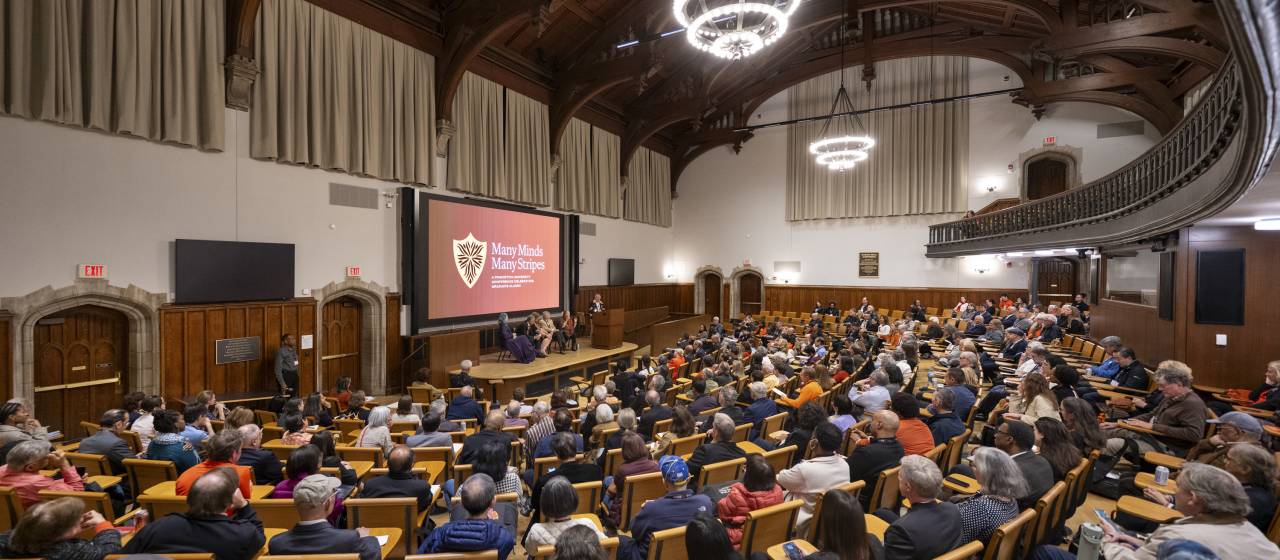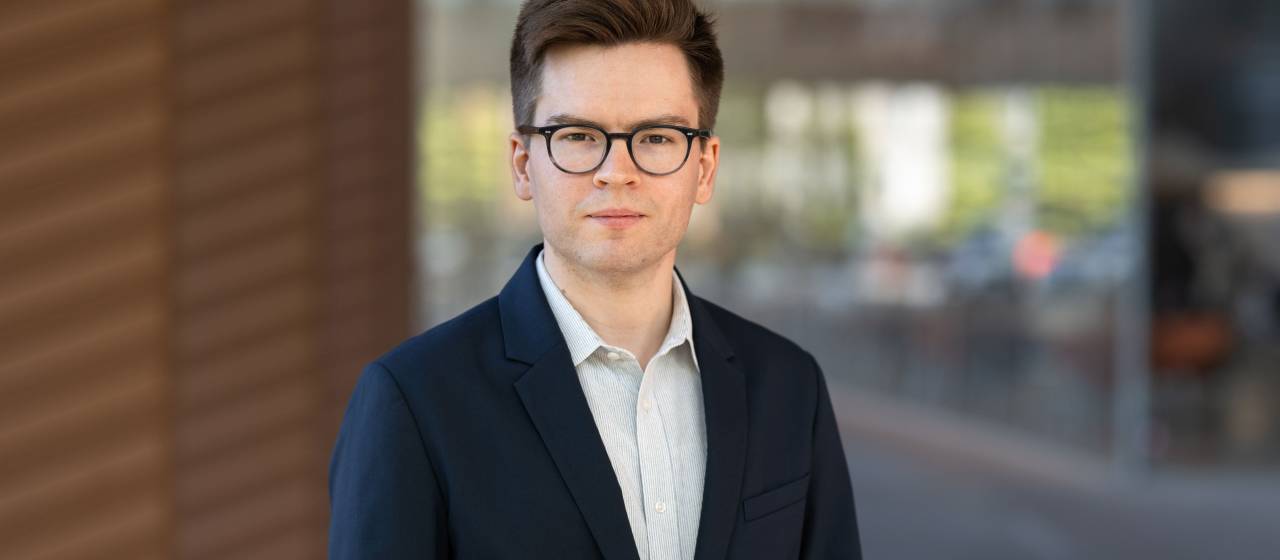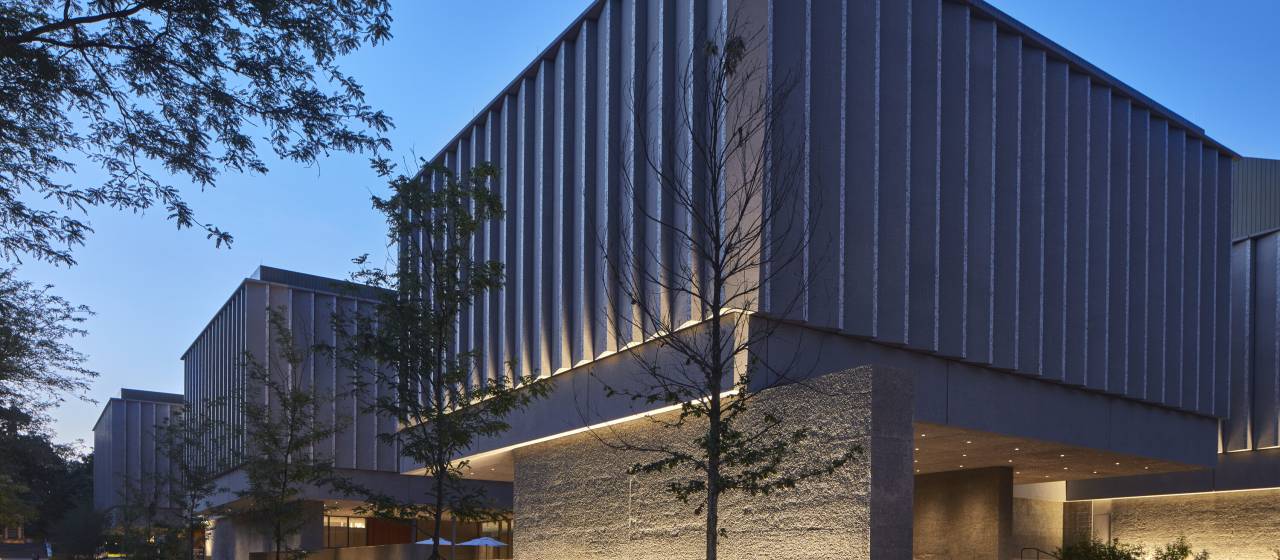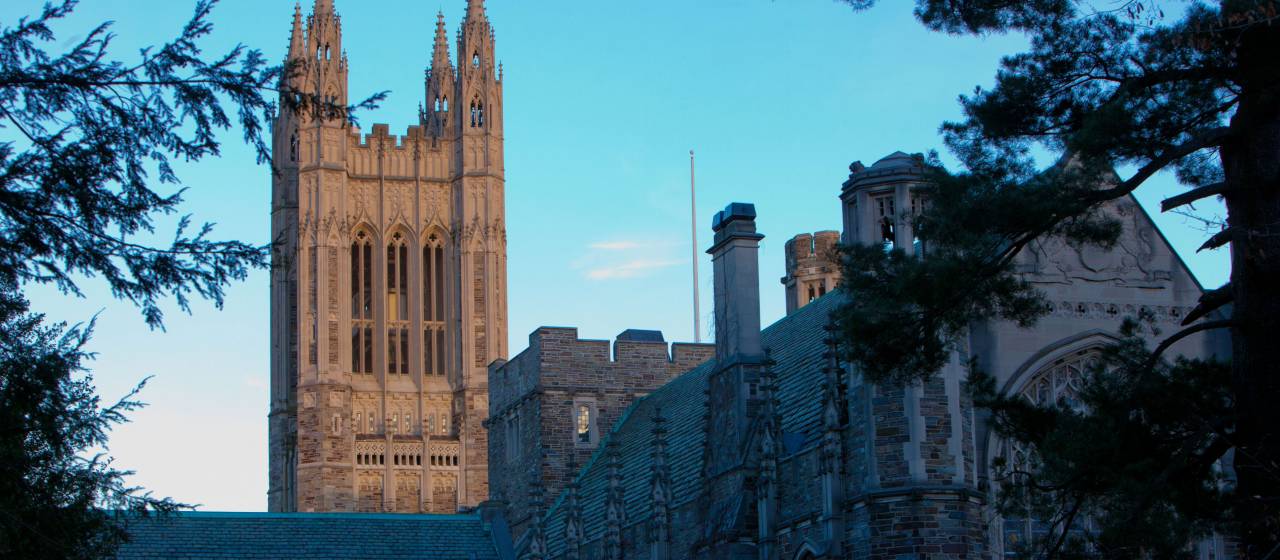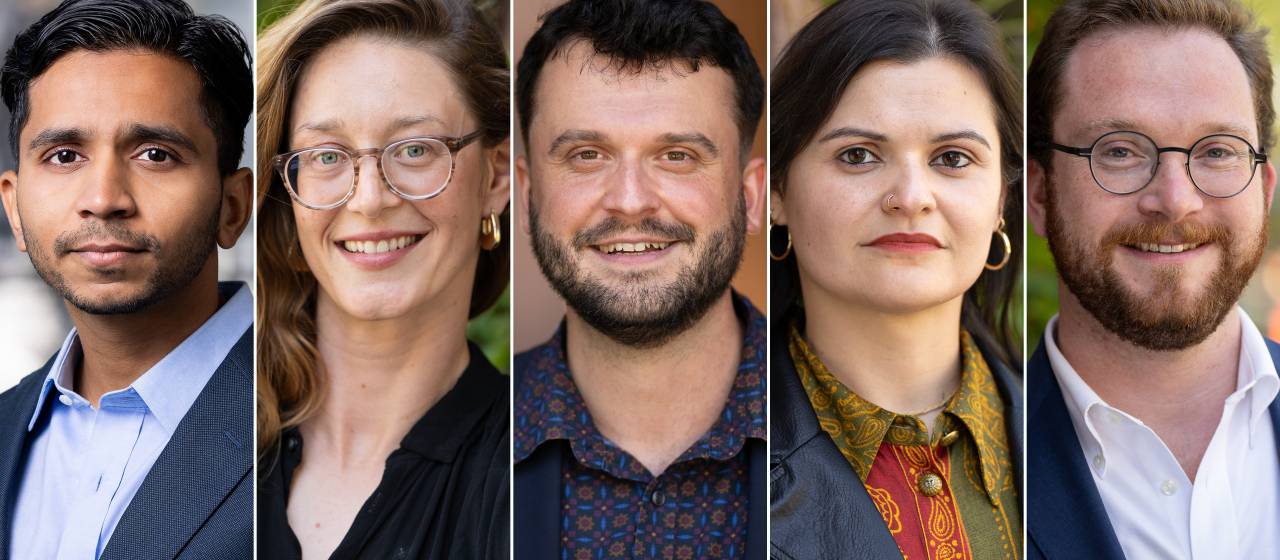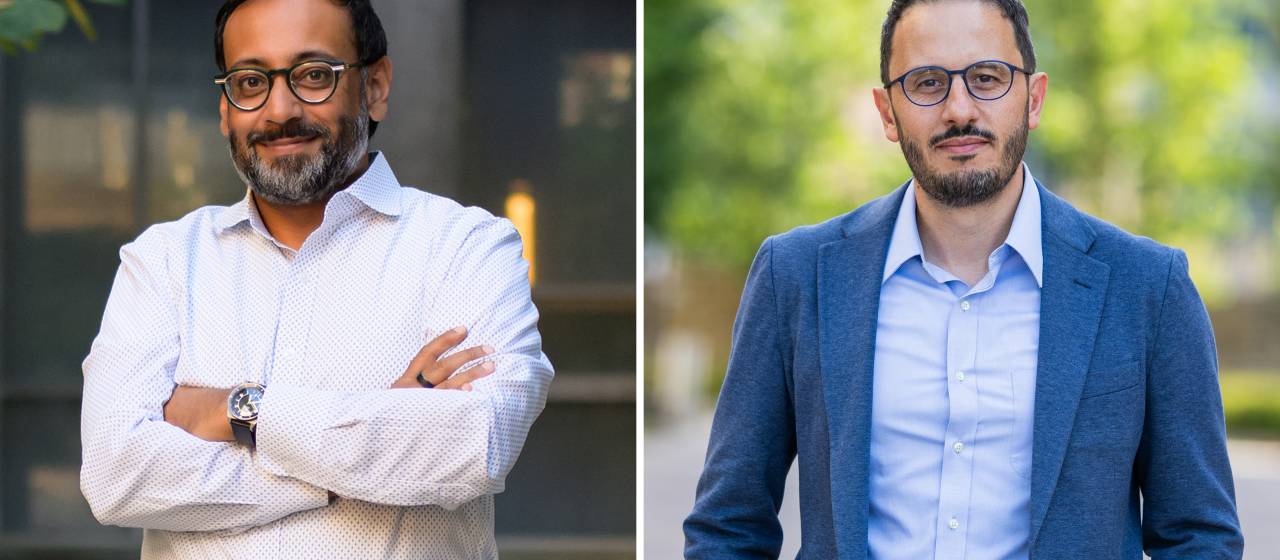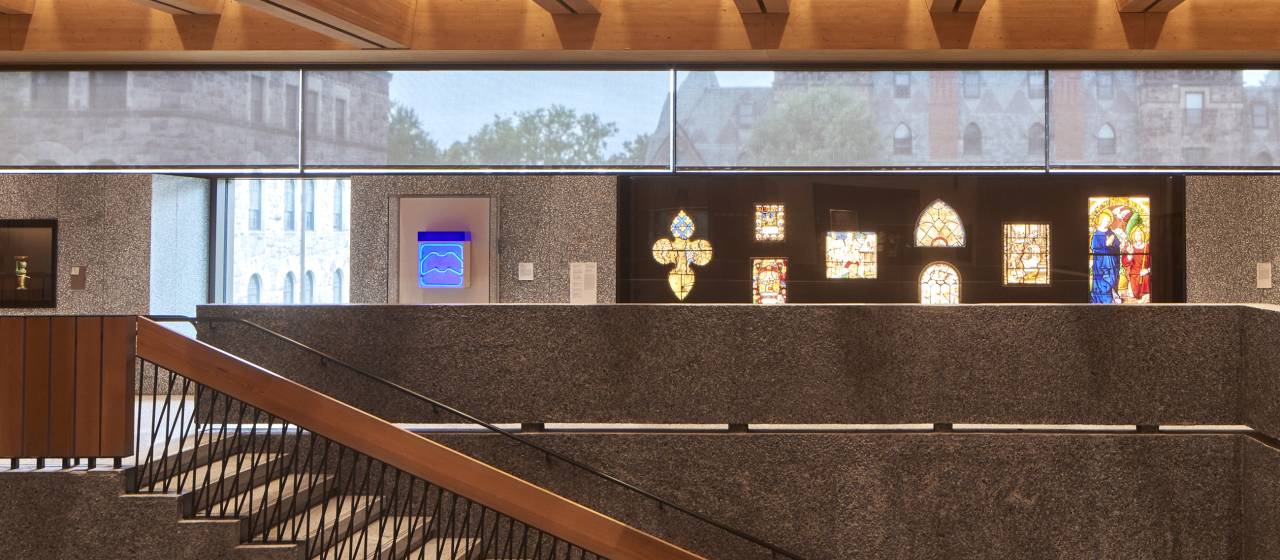'Many Minds, Many Stripes' conference celebrates Princeton's community of graduate alumni
More than 900 Princeton alumni and guests returned to the Princeton University campus on Oct. 9-11 for “Many Minds, Many Stripes: A Princeton University Conference Celebrating Graduate Alumni.” The gathering — the first conference focused on graduate alumni since 2013 — featured panel discussions, faculty lectures, networking opportunities, social events, tours and the launch of the Princeton Graduate School’s 125th anniversary celebration.
Plenary sessions included a conversation between President Christopher L. Eisgruber ’83 and Ann Kirschner *78, president of Comma Communications and co-chair of the conference; remarks from Rodney Priestley, dean of the Princeton Graduate School and the Pomeroy and Betty Perry Smith Professor of Chemical and Biological Engineering; as well as panels on current graduate student life, the uncertainty around federal research funding in graduate education, and the important bonds between academic research and entrepreneurship.
The conference opened on Thursday night in McCosh 50, with “Many Minds” co-chair Laurence Morse *80 welcoming alumni from 39 states and 23 countries back to campus. “We hope that this conference will encourage you to reach out to each other, find commonalities, celebrate differences, and build relationships with one another and with our University that will last well beyond this gathering,” he said. Five alums then took the stage for “Princeton Stories: Journeys of Purpose and Possibility.” Their personal narratives included reflections on graduate life and addressed the value of multidisciplinary studies, taking calculated risks and the importance of self-reflection.
Veronica Pejril *88, president of Queer Princeton Alumni, described how pursuing her Ph.D. in music composition led her to embrace her true identity and eventually become Indiana’s first openly transgender elected official. Joel Johnson *67 recounted several anecdotes from his career in the State Department and Senate Foreign Relations Committee. “[Writing memos for a senator] is not academia — where you write as long as you can about as little as you know,” he said to laughs. “I now must write as short as I can about as much as I know.”
Noemi de la Puente *86 shared her journey from civil engineer to playwright, against the wishes of her father for whom engineering had been the ticket out of poverty in post-civil war Spain. “I bounced between [engineering and the theater] long enough to learn [a few] things,” she said. “One is that engineers and scientists really need to take more acting classes, because you’ve got to get your points across.”
Lawyer and comedian Yasmin Elhady *15 told the story of her difficult path to motherhood as a Muslim refugee raised in Alabama. “We have to be awake and lean into that pain because pain often brings forward something new into the world,” she said.
Karthick Ramakrishnan *02 described how his immigrant experience and loss of his brother during his time at Princeton led him to dig deeper into his University life and to navigate a mid-career transition that helped him become more present as a father of two teenaged sons. “Looking ahead, I see two major priorities for myself,” he said. “One is to be present and engaged during a critical time for my family, and two, being present and engaged during a critical time for our country.”
A thriving Princeton Graduate School
On a brisk Friday morning, alumni gathered in Richardson Auditorium, some adorned with bright orange scarves, others in “GRAD” sweaters and a few wearing the new Association of Princeton Graduate Alumni (APGA) black blazers with orange-star pinstripes.
In his welcoming remarks, Priestley shared his thoughts on the transformational impact of the Graduate School, both on graduate students and the University: “In the current moment, there is ample rhetoric about the state of higher education, but I’m here to tell you that Princeton’s Graduate School is thriving.”

Rodney Priestley, dean of the Princeton Graduate School, affirmed for the crowd gathered at Richardson Auditorium that "Princeton’s Graduate School is thriving,” with new initiatives and an enduring commitment to transformative scholarship.
Priestley shared the many ways the University is continuing to enhance the graduate student experience with respect to financial support, health and wellness, residential and social life, and professional development. “We invest in our students and their education and scholarship,” he said, drawing applause.
Among other important measures that have been taken to help all graduate students thrive, Priestley noted steps to strengthen faculty-student mentorship, a shared governance model of the Graduate School that includes students for the first time, the peer-mentoring Graduate Scholars Program for first-year graduate students, and GradFUTURES, the school’s professional development program.
Priestley welcomed Kirschner and Eisgruber to the stage, and Kirschner began their conversation by asking what it was like to be president of Princeton at this moment in history. “I think I have the best job in the world,” Eisgruber said. While he acknowledged that this is a moment of crisis for higher education, his job, he said, is to communicate why Princeton and other universities are important and worth preserving. “There’s lots of uncertainty, but there are also certain things we can be confident of, that we know are unchanging and we know are good, and we have to lean into those.”
The conversation shifted to how Eisgruber’s leadership style has changed over his nine years as provost and then 12 as president. Eisgruber shared that in his current role, he’s had to “get better and better at communication,” and that this is part of the reason he wrote the book “Terms of Respect: How Colleges Get Free Speech Right,” published on Sept. 30. “I think we have to be messaging very aggressively to Washington and to the broader public around what it is that we do.”

Conference co-chair Ann Kirschner *78 (left) joined Princeton President Christopher L. Eisgruber ’83 in conversation at Richardson.
When Kirschner noted that she’s heard many say that they appreciate Eisgruber’s leadership and noted that “courage is in short supply in higher education,” Eisgruber recalled Justice Louis Brandeis’ opinion in the 1927 Supreme Court case Whitney v. California, which said that the First Amendment presupposes a “courageous, self-reliant” people that is “willing to step up and express your views when it’s hard to do so.” The president shared that he thinks institutions of higher education need to focus on getting their messages out to the broader public: “It has harmed us in higher education that we haven’t been out there talking — and talking especially to our critics and hearing what it is that they have to say to us.”
Eisgruber stressed the need for both free speech and equality on campus, noting they are recurring themes of his book, and paraphrased Brandeis: “The remedy for bad speech is more speech.” He spoke of the need to have civil conversations on campus about tough topics, while supporting diversity and inclusion.
Other topics included:
- How a sense of inclusivity has grown for Princeton graduate students;
- The 2025 Nobel Prize in physiology or medicine, co-awarded to Mary Brunkow *91, as an example of the long-term “audacious bets” that Princeton makes on people and ideas;
- The ways that Princeton is investing in the humanities, including the new Princeton University Art Museum.
The conversation concluded with a lively Q&A session with the audience, and a surprise for Eisgruber: the presentation of a new striped graduate alumni blazer from Laurence Latimer *01, APGA president.
Art and insight
At Seeley G. Mudd Manuscript Library on Thursday afternoon, alumni toured the “Fashion, Feminism & Fear” exhibition. The idea for the exhibit was sparked in 2020 when co-curator April Armstrong *14, who in her role as a collections specialist for the Princeton University Library manages the Special Collections blog, wrote a post about the library’s collection of editorial cartoons by William H. Walker, noting that many of them showed women dressed in pants.
Walker was a popular cartoonist, contributing to Life, Harper’s, the New York Post and other publications, and found the idea of women wearing pants to be ludicrous. Most of the cartoons in the exhibit are from 1896, but the exhibition goes beyond Walker’s cartoons to examine the broader public reaction to the “women in pants” phenomenon. Thematic displays illustrated how pants became popular in sports and cycling and how they were perceived as posing a threat of empowerment, as men feared women would take their jobs and positions in society.
For the conference tour, the curators also shared primary sources that focused on the history of fashion and gender at Princeton, which led to a lively discussion by the group on today’s norms for attire.
“There seems to be just a huge amount of animus, fear and repression involved in what seemingly is a matter of fashion,” said Nora Odendahl *85, who received her Ph.D. in English. “And I think if it were just a quaint historical fact that was buried in the past, it wouldn’t have such resonance. But it still affects us deeply.”

Panelists listen as Africa World Initiative director Chika Okeke-Agulu (far left) speaks on the topic of art acquisitions and repatriation. Joining him for the panel (from left) were MaryKate Cleary, curator of provenance at the Princeton University Art Museum, Nick Napoli *03, an architect and architectural historian, and Dora C.Y. Ching *11, executive director of the Tang Center for East Asian Art at Princeton.
On Saturday morning, alumni filled a lecture room in Robertson Hall for a panel discussion titled “Whose Art Is It?: Controversies and Complexities of Art Acquisitions and Repatriation.” “We will admire the beauty of art, but also confront some uncomfortable truths, truths about ownership, identity, interpretation, power, presentation, ethics and justice,” said Dora C.Y. Ching *11, executive director of the Tang Center for East Asian Art at Princeton, who served as moderator and presented on the Buddhist art removed from China by a Harvard professor in 1924. “When sacred paintings are removed from their original site and displayed in museums [thousands of miles from the communities], are they preserved or plundered or perhaps both?”
Each of the four panelists gave a presentation, including sharing slides of artwork. Nick Napoli *03, an architectural historian and practicing architect, spoke on the excavation of Pompeii by archaeologist Giuseppi Fiorelli in the 1860s and 1870s. MaryKate Cleary, curator of provenance at the Princeton University Art Museum, spoke about a piece of Indigenous art in the Museum’s collection that was repatriated in June 2025 to the Tlingit and Haidi nations in Alaska.
Chika Okeke-Agulu, director of Princeton’s Africa World Initiative and the Robert Schirmer Professor of Art and Archaeology and African American Studies, presented on Great Britain’s invasion of the West African kingdom of Benin in 1897, in which more than 5,000 treasures, known as the “Benin bronzes,” were taken. From there, they were sold into various museum collections, primarily in the U.K., U.S. and Europe. “Around 1960, African nations started calling for the return of these looted objects,” he said, noting that progress has been slow. “This is one of the important debates going on in our day. In fact, it is now at the forefront of the so-called culture war.”
When Princeton SPIA speaks
Alumni and leaders from the School of Public and International Affairs (SPIA) led several panels. On Thursday afternoon in McCosh 10, Amaney Jamal, dean of SPIA and the Edwards S. Sanford Professor of Politics, led the discussion “Dialogue in Action: Leading for the Public Good.” Steven Petric *17, the school’s assistant dean for global outreach, admissions and alumni engagement, highlighted the priority that SPIA places on molding leaders skilled at pursuing constructive dialogue across differences. “The ability to remain in conversation even when we disagree is not just a skill but a responsibility for public leaders,” he said.
Jamal was joined by two SPIA-trained diplomats: Cara Abercrombie *03, former acting U.S. deputy under secretary of defense for policy, and Ajay Bisaria *09, distinguished fellow at the Observer Research Foundation and India’s former high commissioner to Canada and Pakistan and ambassador to Poland and Lithuania. Abercrombie spoke about the importance of finding common ground between parties in defense and military negotiations. “We need to sit down and figure out how to navigate those choppy waters, because the alliance matters,” she said.
“In troubled relationships, we need more diplomacy. We need more conversations, not less,” said Bisaria, who spoke about India-Pakistan relations and India’s response to the current U.S. tariffs.
Graduate alumni in the audience asked about the difficulty of applying these principles of civil dialogue to a broader population that has become increasingly polarized.
“We have an obligation to understand one another,” Jamal said. “With social media, you’re in this introverted world where you can just talk to yourself. It’s not lending itself to the engagement paradigm. We need to reinstall that engagement paradigm in our classrooms, in our homes, in society.”
Similar themes were echoed on Saturday morning in the “Global Governance in an Era of Geopolitical Shifts” panel in Arthur Lewis Auditorium at Robertson Hall.

Amid their thoughtful policy discussion on global governance, panelists shared a laugh. Shown (from left) are SPIA graduate alumni Sophal Ear *97, Ileana Cruz-Marden *19, David Goldwyn *86 and Steven Simon *83.
Led by Sophal Ear *97, associate professor at Arizona State’s Thunderbird School of Global Management, the discussion centered on how nationalism, multipolarity and technological change are rewriting the global terms of cooperation.
Steven Simon *83, distinguished fellow and visiting lecturer at Dartmouth College, said that the Trump administration had backtracked from U.S. policy and international agreements that defined the last 50 years. “[President Trump is] very, very suspicious of global government arrangements,” Simon said. “Rather than seeing these treaties and the accumulation of allies as a force multiplier, as something that enhanced American power on the world stage, he saw treaty partners as parasites, basically, and came to believe that the best thing he could do was provide security on a fee for service basis.”
David Goldwyn *86, president of Goldwyn Global Strategies, LLC, and chairman of the Atlantic Council Global Energy Center’s Energy Advisory Group, presented a perspective through the prism of energy policy, which he said is being used “as a tool of coercive diplomacy.” One silver lining is a slow shift to renewables. “What is proving effective post-COVID and post Russia’s invasion of Ukraine is decarbonization as either a strategy for competitiveness or financial security,” he said. “You see countries thinking that they need to grow their own energy because they don’t want to trust the international system.”
While the audience, in their questions, expressed concern about the current state of global affairs, Ileana Cruz-Marden *19, director of global partnerships at Tent Partnership for Refugees, struck an optimistic note. “I really do want to see this as an opportunity for us to be creative and innovative,” she said, “and for the next generation of scale leaders to step up and say, ‘Okay, if we are starting from scratch — because in some cases, we will have to — how can we make these organizations more efficient and less bureaucratic so that they are more effective and impactful.’”
‘In the service of humanity’

In a session on "Leadership and Public Responsibility," Eddie Glaude Jr. *97, the James S. McDonnell Distinguished University Professor, called for citizens to consider “a view of justice without exception, and then maybe we can figure out a different way of being together, as opposed to being walking mysteries with one another.”
On Friday afternoon in McCosh 10, Eddie Glaude Jr. *97, the James S. McDonnell Distinguished University Professor, explored themes from his 2024 book, “We Are the Leaders We Have Been Looking For,” while weaving in elements of his own journey as an intellectual and writer in a session titled “Leadership and Public Responsibility.”
“My time at Princeton in the graduate college, my time in the Department of Religion was transformative,” said Glaude. “I met some of my closest friends and found my intellectual voice, shaped by Cornel West, Jeffrey Stout and the late Albert Raboteau, who gave me space to be as brazen, bold and irreverent as I could possibly be. So this place holds a special place in my heart.”
Confronting America’s racial history, Glaude said, “there’s a notion of justice that animates our way of life, which certain communities have for themselves, which they ignore for everyone else.”
Citizens, he said, need to speak honestly about our conception of justice and be consistent. “Have a view of justice without exception, and then maybe we can figure out a different way of being together, as opposed to being walking mysteries with one another.”
Over dinner in the Poe Field tent on Friday evening, José A. Quiñonez *98 shared his inspiring personal story. A child immigrant from Mexico who “lived in the shadows” until President Reagan’s 1986 amnesty law, Quiñonez became the founding CEO of Mission Asset Fund (MAF), a San Francisco-based financial institution that provides timely, culturally relevant and successful financial products and services to low-income and marginalized immigrant communities.

José A. Quiñonez *98 (left) shared his inspiring personal story during an interview with Frederick Wherry *00 *04.
Interviewed by Frederick Wherry *00 *04, vice dean for faculty development and inclusion, director of the Presidential Postdoctoral Research Fellows Program and Townsend Martin, Class of 1917 Professor of Sociology, Quiñonez remembered the many “angels in our midst” who helped him help so many. One was an administrator at the University of California-Davis, where he was an undergraduate, who urged him to apply to the Princeton Graduate School. Another was the MacArthur Foundation, which delivered a “genius” grant in recognition of the MAF model he’d created.
In 2021, when the COVID-19 crisis crippled MAFs operations, another angel appeared. Philanthropist Mackenzie Scott ’92 awarded MAF $45 million to provide direct relief to those hit hardest by the pandemic. “She and her staff recognized the work that we were doing in these emergency grants that we were providing to people that were excluded from receiving federal support,” Quiñonez said. “We put that [money] right to work … to improve their financial lives after the devastating pandemic.”
Reflecting on his life since graduate school at Princeton, Quiñonez said he only wishes that he’d dreamed bigger and he exhorted current students to do the same. “Look for your angels, look for your helpers,” he said. “Don’t be afraid to reach out to people, because we’re there. Even in the midst of this chaotic, crazy moment that we’re living through as a country, there are still helpers there.”
The next generation of scholars and leaders

Current civil and environmental engineering graduate student Caridad Estrada said her involvement in student government, GradFUTURES and mentorship programs has helped her "to really fly here.”
At “The Current Graduate Experience” panel discussion on Friday morning, four Princeton graduate students took the stage in Richardson Auditorium to share what it’s like to be on campus today and explain how their experiences extend far beyond their labs and classrooms.
Javier Morales, a fourth-year grad student at the Princeton Plasma Physics Lab, talked about how his involvement in the Graduate Scholars Program and community outreach programs at local high schools fortified his confidence as a scientist and reaffirmed his love for the research he’s doing. Cecelia Ramsey, a fourth-year grad student in the French and Italian department, recounted how her work with the Princeton Prison Teaching Initiative — tutoring incarcerated women in French — has underscored the impact language and literature can make.
Third-year anthropology grad student Nikita Taniparti described her transition from economics to anthropology and her work at the University Writing Center. “When I tell people I love writing, they kind of freak out a bit and ask me how to use AI instead,” she said. “But at Princeton, writing is thinking, so I think it’s especially important to show them how much writing can open their minds.”
Third-year civil and environmental engineering grad student Caridad Estrada said that her involvement in student government, GradFUTURES and mentorship programs has fueled her academic work. “The relationships I’ve cultivated with individuals in the administration have given me opportunities to really fly here,” she said. “I’ve had interactions that I’ll take with me throughout my career.”
Current graduate students and alumni mingled on Saturday afternoon in the Weickart Atrium of the Louis A. Simpson International Building during “Find Your Community: Alumni Engagement Opportunities,” a fair to introduce alumni service programs and connect people with their interests. Attendees took advantage of the free headshots offered by a professional photographer and engaged with University staff and alumni volunteers about the Princeton Prize in Race Relations, GradFUTURES, the APGA, regional associations, TigerNet, and dozens of other alumni volunteer programs and resources.
Good for business

Molecular biology research in Bonnie Bassler's lab evolved into a commercial venture for graduate alum Justin Silpe *20 (right), who told Princeton vice dean for innovation Craig Arnold (left) that the Keller Center, the National Science Foundation Innovation Corps (I-Corps) and other resources helped his startup gain traction.
Friday’s lunch conversation, in the event tent on Poe Field, focused on the translation of academic research into business opportunity. Craig Arnold, vice dean for innovation and the Susan Dod Brown Professor of Mechanical and Aerospace Engineering, interviewed Justin Silpe *20, a Princeton molecular biologist-turned-entrepreneur who co-founded PumpKin, a University spin-out company that develops innovations for parents who pump breastmilk.
Charles Goldstein *71, an adviser and investor in the heathcare field, introduced the session by observing how much the climate for entrepreneurship has changed on campus. When he was a chemistry graduate student, he asked the dean about exploring the more “commercial side of things.” The dean briskly replied that Princeton was not a business school. “Some people said you were selling out if you did such a thing,” Goldstein said. Now, he noted, the University has the Keller Center for entrepreneurship and an Office of Innovation.
Silpe explained how he founded PumpKin when his baby rejected frozen breastmilk because its taste had changed between pumping and freezing. Working in the lab of Bonnie Bassler, the Andrew K. Golden University Professor of Molecular Biology and then-chair of the department, Silpe began researching food-safe chemistry solutions to the problem. What began with a focus on the science evolved into a commercial venture, in part with the aid of resources including the Keller Center and the National Science Foundation Innovation Corps (I-Corps) program, which offers grants and mentorship. Princeton also helped the startup with early customer discovery and intellectual property questions, Silpe said.
“Taking part in Princeton entrepreneurial programs has been amazing because it’s personalized [the process] in a way only Princeton can do, but then they also connect you to the right people,” he said.
At Saturday’s lunch session, “Many Minds” co-chair and University trustee Yan Huo *94 said, “One of the great joys of serving in these volunteer roles is that they allow me to stay closely connected with the faculty, administrators, students and alumni and to witness firsthand the exciting and impactful work being carried out on and beyond this campus.” He then introduced Sarah Nagy *14, a data scientist and founder of the company SeekAI, and Jennifer Rexford ’91, University provost, the Gordon Y.S. Wu Professor in Engineering and professor of computer science, for a “Conversation on the Future of Artificial Intelligence.”
Nagy said she believes AI and human creativity will be complementary. “I don’t think AI is creative in that same way humans are,” she said. Some jobs will change, she suggested, some will be newly created and some may disappear. “I think AI companies are going to do phenomenally well. I think their customers are going to do really well. … But what happens to everybody else? That's the disequilibrium that needs to be solved.”
Rexford said university settings like Princeton can bring interdisciplinary thinking to those challenges, “having people that work on philosophy, ethics, policy, government, interacting with technologists, so that you can do work at those intersections to make sure we figure out the right guardrails.”
At Saturday night’s closing dinner, Priestley unveiled a new video that celebrates the history of graduate education at Princeton — beginning with James Madison — and 125 years of the Princeton Graduate School. “Graduate alumni make up nearly one-third of all Princeton University alumni,” Priestley said in the video. “Earning an advanced degree at Princeton is a demanding endeavor that requires the best of our students, but a Princeton graduate education prepares emerging scholars to lead lives of impact, leadership and service.”
In his closing remarks, President Eisgruber thanked the scores of volunteers — especially “Many Minds” co-chairs Yan Huo, Ann Kirschner and Laurence Morse — the Alumni Engagement team, Princeton Graduate School staff, and the administrative members and Princeton departments that made “Many Minds” such a success. He urged attendees to take the stories they had heard at the conference and share them with the world. He pointed to the Stand Up for Princeton and Higher Education campaign, which is an initiative engaging Princeton alumni, students, faculty, staff and friends to help speak out on behalf of colleges and universities.
“I’m going to be doing everything I can to get the message out there,” said Eisgruber, as the audience of cheering guests rose to their feet. “And in these difficult times, I will also tell you this: We are going to be standing up for academic excellence, we are going to be standing up for academic freedom, we are going to stand up for our international students, we are going to stand for diversity, equity and inclusion, and we are going to stand up for the mission of this University.”
To cap the dinner, the conference steering committee joined graduate student Bonnie Ko on stage to lead the audience in singing “Old Nassau.”
Earlier in the conference, APGA president Laurence Latimer told his story about how attending the 2013 graduate alumni conference redefined his relationship with Princeton and that he hoped this “Many Minds” event would do the same for others. After three crisp days on campus, full of debate, discussion and engagement, there were promising signs.
“I came here after many years, and I just loved the conference,” said Nicola Walter *92. “It was very stimulating, inspiring and it was great to connect and meet new people. I thought it was exquisitely well organized and just really loved the experience —– the variety of topics for lectures and also meeting people from different backgrounds and different departments. I look forward to becoming more involved.”
Sean C. Downey, Jeff Labrecque, Catherine Mallette and Don Steinberg contributed to this story.
Latest Princeton News
- Michael Skinnider wins 2025 Packard Foundation Fellowship
- A ‘town square for the arts and humanities’: The new Princeton University Art Museum shares opening details
- The ‘Many Minds, Many Stripes’ conference celebrating Graduate School alumni is underway on campus
- Society of Fellows in the Liberal Arts welcomes new scholars
- Princeton alumni Nabarun Dasgupta '00 and Sébastien Philippe *18 win MacArthur 'genius' grants
- Venture Forward gifts name multiple spaces within the new Princeton University Art Museum



